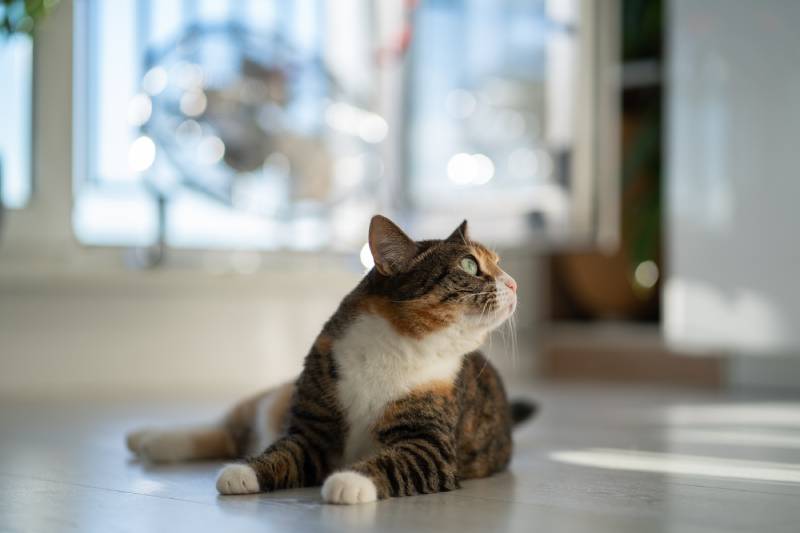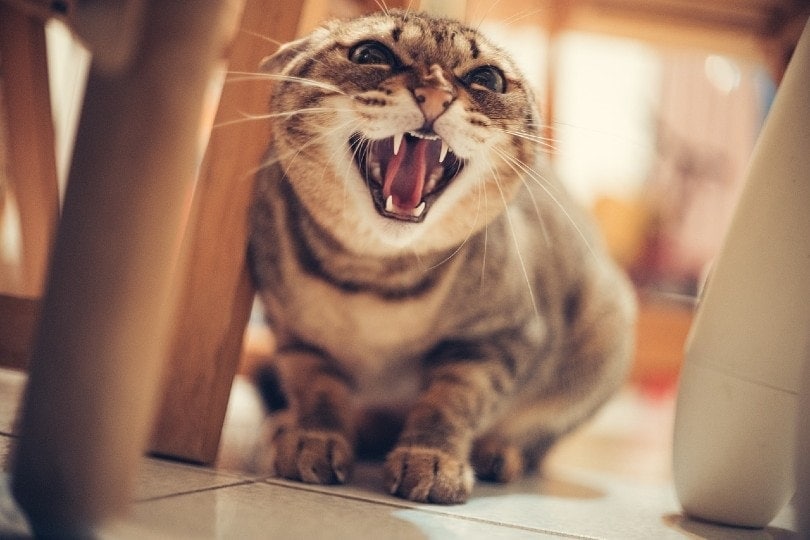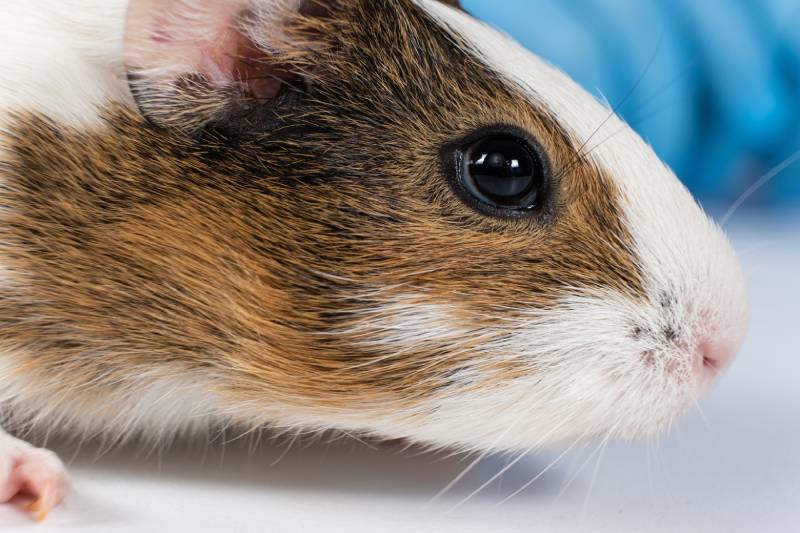VET APPROVED

The information is current and up-to-date in accordance with the latest veterinarian research.
Learn more »Click to Skip Ahead
Cats may be finicky creatures, but they are also creatures of habit. If your cat has suddenly stopped eating or drinking, it’s a cause for serious concern that requires prompt veterinary attention. While some healthy adult cats may be able to survive just over a week without food, assuming they have access to water, it is likely to leave permanent consequences on their health from which they may not recover. If they are not drinking water, they will only survive for a maximum of 3 or 4 days.
These time frames will be considerably shorter for kittens, young cats, older cats, and those suffering from underlying health issues, and they will greatly depend on environmental factors such as temperature and humidity.
Time is vital for restoring your cat’s eating and drinking habits. This article will share some tips for how to tell if your cat is eating and drinking properly. If you cannot get your cat to eat or drink for 12-24 hours, reach out to your vet immediately.

How Long Can Cats Go Without Food and Water?
Cats can go without food longer than they can go without water. If a healthy adult cat is not eating but is drinking, in theory, they may survive longer than a week, or rarely close to two weeks, but not without serious and often permanent health issues. However, if a cat is not drinking, they will not last longer than 3-4 days maximum.
This is because water is essential to the most key parts of the body. Without it, the cat will experience severe dehydration, all vital organs will swiftly lose their ability to function, and your cat’s body will shut down. Dehydration can occur within 24 hours, or even quicker in kittens, very small, young, older, or sick cats, so returning your cat to healthy drinking habits is essential.
How Much Food Do Cats Need?
Your cat needs a complete and balanced high-quality food high in protein, moderate in fat, and low in carbs. It should also follow the recommendations set by the Association of the American Feed Control Officials. With that in mind, there are specific caloric requirements based on the weight, age, size, lifestyle, and health. An average healthy adult cat in ideal body condition, weighing 4.5 kg or 10 lbs, needs 240-270 kilocalories per day. If your cat goes too long without food, they will experience serious health consequences, some of which can be irreversible and even fatal.
Since cats are creatures of routine, it is best to feed them regular amounts at regular times. If your cat has a feeding routine, it will be much easier for you to notice when that routine has been disrupted. It’s also crucial to tailor your cat’s nutritional requirements to their age and lifestyle to avoid obesity. Consult with your vet about the exact amounts of food your cat should be eating.
How Much Water Do Cats Need?
Measuring your cat’s precise water intake can be difficult, and in most instances, you shouldn’t need to. Still, a general rule veterinarians recommend is that cats drink around 1 cup for every 10 pounds. Some cats may drink more or less, depending on the type of food they consume, so the most important thing to know is how much is normal for your cat.
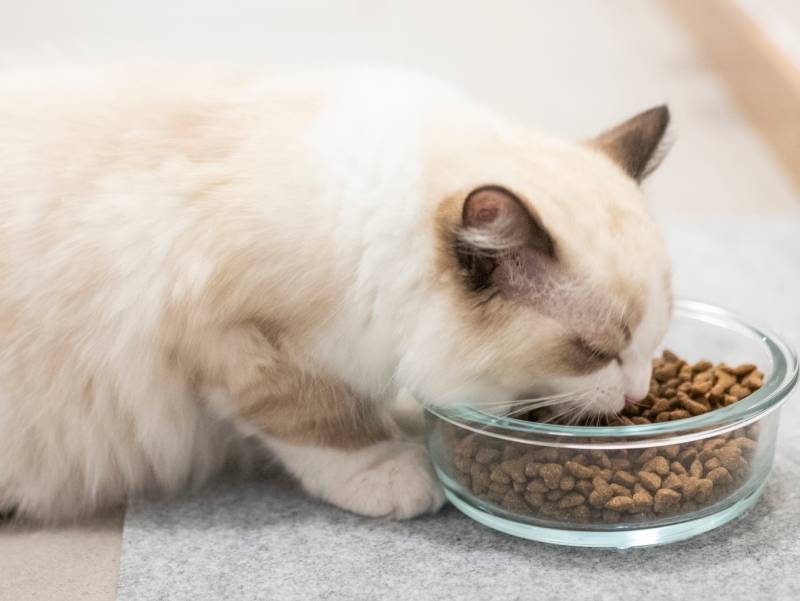
How Long Can a Kitten Go Without Food and Water?
Kittens will not survive long without food and water. At most, the average kitten will survive 2 days without food. But even after a day without food, a kitten will suffer extreme malnourishment and dehydration, and will need immediate veterinary care.
There are nuances to feeding a newborn kitten, as their steady growth will demand different feeding requirements every few weeks. The recommendations below will also vary based on the individual kittens’ health and appetite, as some may need to be fed more often.
| Age | Food Required | Times Per Day Fed |
| 1–3 Weeks | Their mother’s milk or kitten formula | 10-12 |
| 3–4 Weeks | Their mother’s milk or kitten formula | 6-8 |
| 4–5 Weeks | Their mother’s milk, with the addition of kitten wet food | 5-6 |
| 5–6 Weeks | Kitten wet food | 5-6 |
| 6–7 Weeks | Wet and dry food | 4-6 |
| 7–8 Weeks | Wet and dry food | 2-4 |
| 8+ Weeks | Wet and dry food | 2–4 |
Why Is My Cat Not Eating?
Trying to figure out why your cat is not eating can be a frightening and frustrating process. There are many reasons why a kitten or cat may have stopped eating, and the quickest and most efficient way to discover why is to consult your vet.
Why Your Kitten Won’t Eat Their Food
- They have been weaned too abruptly. While your kitten is being weaned onto regular cat food, either from their mother’s milk or formula, they may be picky about what they eat, especially if the change to cat food has not been gradual enough. You can encourage them to eat by changing the flavor, consistency, or shape of the food to make it more palatable and easy to ingest. You can also warm it up or start offering it early on, alongside the mother’s milk or formula, so they can get used to it. Reduced appetite is sometimes combined with the stress of being separated from the mother and littermates when kittens go to their new homes.
- They are sick. Respiratory infections, gastrointestinal issues, or other underlying health concerns could cause your kitten to avoid eating. This will quickly lead to dehydration and health complications, which is why it requires urgent veterinary attention.
- They are scared. Sometimes, especially combined with the stress of being weaned and then separated from their mother, kittens may feel overwhelmed and frightened in their new home for the first few hours. The same goes if there are other pets in the home, such as dogs, that they are not used to. If you provide a safe, peaceful space for your kitten to eat and rest, they may be more comfortable.
Why Your Adult Cat Won’t Eat Their Food
- They are sick. Whether it is an upper respiratory infection, gastroenteritis, underlying organ system disease, heart disease, or something else, illnesses in adult cats can and will affect their appetite. If you suspect a medical issue, take your cat to the vet immediately.
- They may have dental problems. Dental problems can cause inflammation and pain in your cat’s mouth, so if you notice any redness or sores, drooling, awkward chewing, dropping food, bad breath, or pawing at the mouth, this is a sign that they need medical care.
- They are stressed. Anxiety, stress, fear, and changes in their routine can impact your cat’s appetite and behavior.
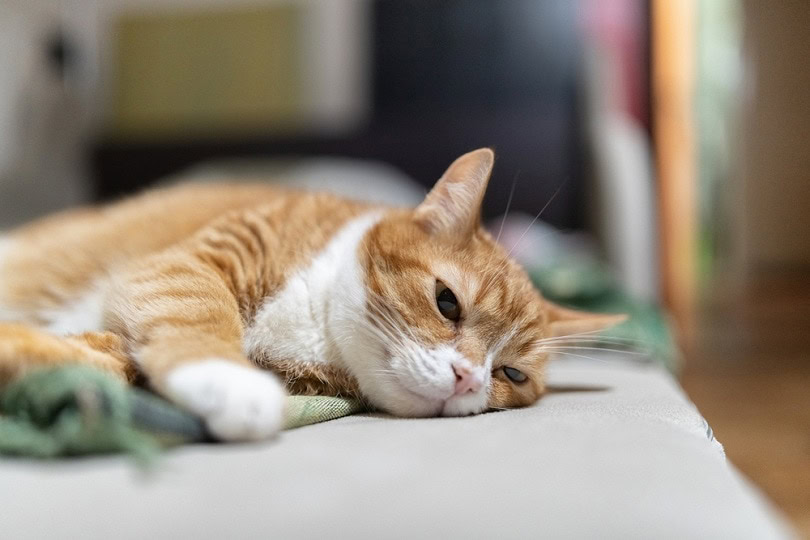
Why Is My Cat Not Drinking?
Cats can be a bit strange about drinking water. However, if your cat drinks less than usual, it is a cause for concern, as well as if they drink more than usual. Here are some of the following reasons why your cat may not be drinking as much:
- Their water bowl is not clean. Cats are very particular about the cleanliness of their water, so if your cat’s water bowl is not clean, they may avoid drinking from it. Many cats will prefer drinking from a water fountain, rather than a bowl, so make sure to offer both.
- They do not feel safe enough to drink. If the water bowl is in an area with high foot traffic or a lot of noise, your cat may be too stressed to go near it.
- They have a medical condition. Many illnesses will cause your cat to drink less (or more) than usual. In order to play it safe and get any possible health issues diagnosed promptly, it’s best to consult your vet.
Keeping your cat hydrated can be surprisingly difficult. A filtered water fountain like Hepper's Stainless Steel Cat Water Fountain can provide your cat with safe, flowing water free from dangerous bacteria and bad smells.
- Premium 304-Grade Stainless Steel - This metal cat water fountain is hygienic, with superior...
- Serene & Healthy Cat Drinking Fountain Experience - With whisper-quiet pumping & an advanced...
- Say Goodbye to Dehydration - Provide your cat with a constant source of flowing water with this...
This dishwasher-safe fountain features advanced triple filtration, three different flow modes, and a modern, minimalist design.
At PangoVet, we've admired Hepper for many years, and decided to take a controlling ownership interest so that we could benefit from the outstanding designs of this cool company!
How to Know if Your Cat is Dehydrated
The signs of dehydration can be subtle, so it is essential to monitor your cat’s behavior and well-being closely. Some indications that your cat is dehydrated include the following:
- Skin tenting
- Dry gums
- Sunken eyes
- Vomiting
- Lethargy
- Weakness
If you notice any of these signs, it is vital to get professional treatment for your cat right away.


Conclusion
Realizing that your cat is not eating or drinking sufficiently or at all can be scary. When a cat or kitten stops eating or drinking, there is often an underlying medical cause. To ensure your cat’s safety and well-being, reach out to your vet when you notice any signs that your cat is no longer eating or drinking as usual.
- How often should you feed your cat? | Cornell University College of Veterinary Medicine.
- Feeding Times and Frequency for Your Cat | VCA Animal Hospitals
- factsheet – orphan kittens considerations and care
- How Much and How Often You Should Feed Your Cat | Preventive Vet.
- 6 Reasons Why Your Cat Is Not Eating and What To Do | PetMD
- Why Your Cat Won’t Drink Water and What to Do
Featured Image Credit: Dima Berlin, Shutterstock
